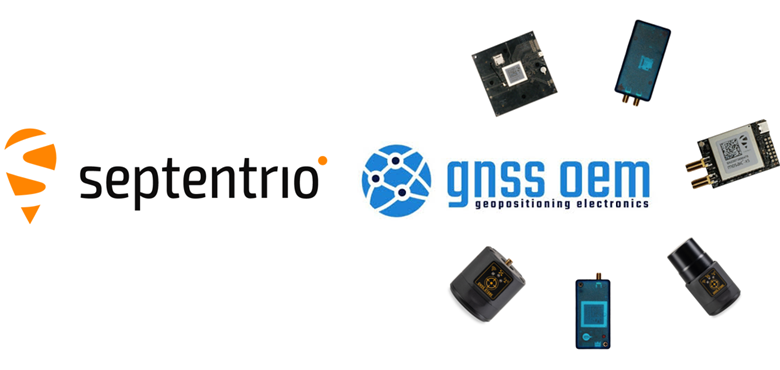Septentrio, a leader in high-precision GNSS* positioning solutions, is collaborating with GNSS OEM Store, provider of user-friendly centimeter-level GNSS modules, antennas, and development kits for individuals and professionals.  A variety of new evaluation boards, dongles, compact smart antennas and other plug-and-play systems have been developed by GNSS Store. These new products are based on the renowned mosaic GNSS module, including the mosaic-X5 positioning module, mosaic-H heading module and the mosaic-T timing module.
A variety of new evaluation boards, dongles, compact smart antennas and other plug-and-play systems have been developed by GNSS Store. These new products are based on the renowned mosaic GNSS module, including the mosaic-X5 positioning module, mosaic-H heading module and the mosaic-T timing module.
The mosaic is a compact GNSS receiver delivering high-accuracy tri-band positioning with outstanding reliability due to built-in technology that allows it to be highly resilient to signal interference including jamming and spoofing**. The new products integrating mosaic offer additional connectors and various interfaces, convenient for evaluating this GNSS receiver.
The new products from GNSS Store enable sub-centimeter level location accuracy with its multi-band, multi-constellation and high precision RTK (real-time kinematic) capabilities. These solutions are a perfect choice for demanding high-precision navigation and positioning use-cases like precision agriculture, unmanned aerial vehicles (UAV) and robotic applications. Additionally, the products are plug-and-play compatible with open-source community RTK networks.
“This collaboration strengthens our commitment to making our robust and resilient positioning technology accessible to everyone. The versatile new products designed by GNSS Store add to the rapidly growing ecosystem around the mosaic GNSS module,” said Gustavo Lopez, Market Portfolio Manager at Septentrio.
The new boards and dongles integrating mosaic are now available for purchase via the GNSS Store website. Stay tuned for more mosaic-based products coming soon. Meet Septentrio GNSS experts at ROSCon 2024, on October 21-23 in Odense, Denmark. Check out Septentrio’s community page listing other innovative partners as well as open-source hardware and software projects that simplify integration of high-accuracy positioning. For more information about mosaic or other positioning solutions please contact the Septentrio team.
* Global Navigation Satellite System including the American GPS, European Galileo, Russian GLONASS, Chinese BeiDou, Japan’s QZSS and India’s NavIC. These satellite constellations broadcast positioning information to receivers which use it to calculate their absolute position.
** Jamming is a form of radio interference which occurs when GPS frequency is overpowered by other radio waves, resulting in accuracy degradation or event total loss of position. Spoofing is a malicious form of radio interference, where misleading signals are sent into the receiver, resulting in faulty coordinates, which lead the target away from its predefined track.
About Septentrio:
Septentrio has its headquarters in Leuven, Belgium and has a world-wide presence with offices in Los Angeles, Shanghai, Seoul and Yokohama as well as numerous partners around the world. To learn more about Septentrio and its products, visit septentrio.com or follow us on LinkedIn, Twitter and GitHub.
About GNSS Store:
Source: Septentrio
















Comments